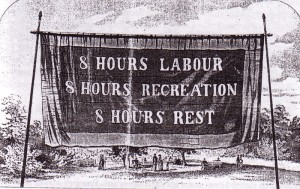It’s an interesting exercise to sit down and add up all of the things you think you should be doing every day and see how much time doing all of those things would actually take.
I would like to bet that meditating, blogging, journaling, reading, visualizing your day, gratitude-listing, cooking and eating healthy meals, taking your vitamins, exercising, brushing and flossing, handwriting thank you notes, never lunching alone, calling your mom, and oh right, also putting in a full day of work, taking care of family, and getting the 7 to 8 hours of sleep we are supposed to get for most people will simply not fit in a 24-hour time span.
And yet if you read articles like “5 Things Super Successful People Do Before 8 a.m.” you might walk away feeling like there’s something wrong with you if you can’t fit in half of that list before 8 o’clock in the morning.
Every time a new article comes out telling you why writing every day is good for you or that you’ll be happier if you [fill in the blank], it is difficult to not feel compelled to add those things to the list of expectations that you have for yourself and then feel disappointed in yourself when you somehow can’t magically fit 30 hours of activity into 24.
Part of that disappointment comes from the fact that we assume that if other people are sharing this advice with us, they must have somehow figured out a way to follow all of it.
Advice meant as a map to help us on our journey, we end up treating as a measuring stick of our own abilities and potential.
We have been storytelling and map-making for centuries as a way to help the next people after us find their way, getting through their journeys with fewer trials and tribulations.
Without maps we’d spend our days wandering around constantly having to discover and rediscover the same things over and over again, staying longer in the same spot instead of making forward progress.
But a map is most useful when it shows you all of the potential paths, not just one way to go.
The internet has been a boon for the sharing of wisdom, roadmaps, and advice, but it has also created a whole marketplace for the sharing of what appears to be a single correct route to success. Advice on hacking our lives toward better performance and productivity and happiness is the dieting advice of this decade.
And just like dieting advice, it can often feel prescriptive and closed, instead of something that is exploratory and open.
So we have to bring the exploration and openness back to it.
We can shift from seeing an article about how early risers are more successful as a dictatorial decree (no matter how the headline is written) to seeing it is an invitation for us to explore, to keep our own curiosity about ourselves alive, and to check in with ourselves about how intentional we are being about what we do with our time and how our current habits are working for us.
If you find that when you sleep until 8 or 9 a.m. you always wake up feeling behind and feeling that you have to rush through your day, then waking up earlier could be good for you. Not because it checks off the “waking up early” box, but because it could make you feel better.
But only you know that.
All of these suggestions give us an opportunity to check ourselves, to check what we “know,” to check the assumptions we’ve made about what we can and can’t do. If in the back of our minds we’ve always wanted to write but keep telling ourselves we don’t have time, is that really true? How important is that to us? If it’s that important why aren’t we finding even ten minutes a day to do it?
At its best, the wisdom and experience of others leads you to ask yourself important questions that help you, in turn, develop deeper wisdom about yourself.
It is a map with multiple routes. A choose your own adventure with wise hints along the way.





